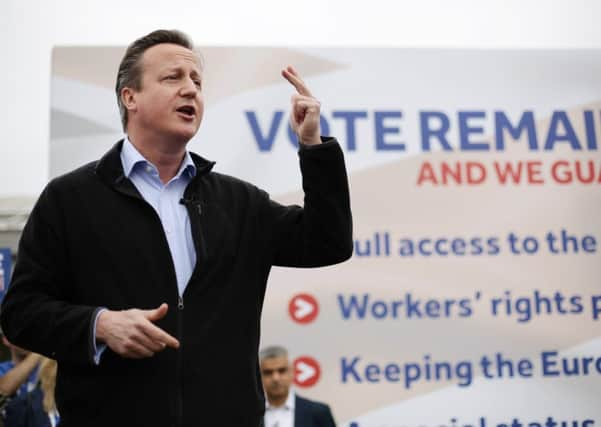Richard Shaw: Why small businesses should remain put in EU


The EU represents a huge territory in which it is easy to do business. Many bemoan it as a bureaucratic nightmare, but how quickly they forget how challenging it was dealing with individual European countries, and the difficulties faced trying to sell goods in Barcelona rather than Birmingham.
Having a single market across so many countries requires regulation and a degree of standardisation – something that frequently creates headlines about the size of sausages, and the curvature of bananas, but for industry it’s a necessity.
Advertisement
Hide AdAdvertisement
Hide AdAlmost every country in the world has some form of standards, some of which are more widely used than others. The emergence of European Standards have done far more than simplify trade in the EU. They’ve had a significant impact globally and, in some cases, have formed the basis of International Standards.
The idea that by leaving the EU we will no longer suffer interference from Brussels in this particular arena is nonsense. European Standards will still exist and we’ll still have to comply if we wish to sell into Europe. And if we leave the EU, we’ll no longer have a seat at the table when these standards are drafted – a seat from which we currently punch well above our weight.
There are those that say leaving the EU will enable us to trade freely across the world without Europe holding us back. What they are talking about are import tariffs.
Every country has import tariffs and some believe a UK unshackled from the EU will be able to negotiate more-advantageous tariffs. There are two major problems with this.
No one knows if it’s true.
No one knows how long these negotiations would take.
Advertisement
Hide AdAdvertisement
Hide AdEU migration is another topic often portrayed as a problem when it is actually an advantage for the UK. As our economy grows, it needs more people.
Net immigration in 2015 was 336,000. In the same period, 50,000 people left public sector employment due to austerity measures. Yet the private sector absorbed all of these and more. Our unemployment rate of 5.4 per cent is a 10-year low, and we also have the highest level of employment ever.
The UK is also at a significant advantage when it comes to attracting the cream of European migrants because almost half of the 500 million people in the EU speak English as either a first or second language.
These people are not a liability. They are a major asset. Some 62 per cent of those who come here are graduates (compared to 24 per cent of the UK population), and we haven’t even had to pay for their education.
Advertisement
Hide AdAdvertisement
Hide AdParliamentary sovereignty is the lynchpin of the “out” campaign. However there is a difference between sovereignty and autonomy. Sovereignty is a legal concept, but autonomy is our true freedom to act.
If we leave the EU, we might technically regain some aspects of sovereignty that were voluntarily given up by being members, but our freedom to act would still be constrained by the EU (should, as most likely would happen, we join the European Free Trade Association – EFTA), and all the other trade agreements we subsequently negotiate.
Interestingly, membership of the EU is only one area where Parliament has passed laws that limit the application of Parliamentary sovereignty. Others include the devolution of power to the Scottish Parliament and Welsh Assembly; the Human Rights Act 1998 and the decision to establish a UK Supreme Court in 2009, which ended the House of Lords’s function as the UK’s final court of appeal.
Neither membership of the EU, nor any of the other changes, undermine the principle of Parliamentary sovereignty because, ultimately, Parliament is able to repeal any law.
Advertisement
Hide AdAdvertisement
Hide AdIn fact, the current debate and looming referendum clearly demonstrate that Parliamentary sovereignty, far from being eroded, is alive and well.
A final point, probably more important than all the rest, relates to the continued existence of the EU. Europe has been in a state of flux for centuries and the EU is its most peaceful iteration. Everyone agrees the EU isn’t perfect, but no mainstream politician seems to be saying we would be better off if it didn’t exist.
The EU itself has been in a constant state of change since its inception and it seems unwise to increase the risk of its fragmentation.
The UK has a history of facing up to challenging odds and has an obligation to society. We should take a responsible role in helping to shape that change, by keeping our seat at the table.
Advertisement
Hide AdAdvertisement
Hide AdRichard Shaw is the managing director of Ellis – a North Yorkshire-based SME that lays claim to being the world’s leading designer and manufacturer of cable cleats. He is writing in a personal capacity.